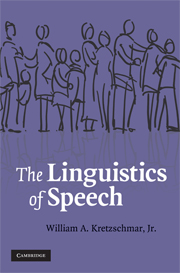Book contents
- Frontmatter
- Contents
- List of figures
- List of tables
- Acknowledgments
- The road not taken
- Introduction
- 1 The contemporary marketplace of ideas about language
- 2 Saussure
- 3 Evidence from linguistic survey research: basic description
- 4 Statistical evidence from linguistic survey research
- 5 Evidence from corpus linguistics
- 6 Speech as a complex system
- 7 Speech perception
- 8 Speech models and applications
- References
- Index
7 - Speech perception
Published online by Cambridge University Press: 03 July 2009
- Frontmatter
- Contents
- List of figures
- List of tables
- Acknowledgments
- The road not taken
- Introduction
- 1 The contemporary marketplace of ideas about language
- 2 Saussure
- 3 Evidence from linguistic survey research: basic description
- 4 Statistical evidence from linguistic survey research
- 5 Evidence from corpus linguistics
- 6 Speech as a complex system
- 7 Speech perception
- 8 Speech models and applications
- References
- Index
Summary
Dennis Preston has been the central figure in recent decades for the renewal of interest in what he has called “perceptual dialectology” (1989, 1999). While much work in the area has concerned itself with whether people can perceive dialect boundaries asserted by linguists (see Chapter 3, and below), the stakes for “perceptual dialectology” are actually larger than that (Kretzschmar 1999: xvii):
The general view would have it that the linguistics of speech should be concerned with what people actually say. Speech production surely has had the majority of the attention in empirical linguistics, whether under quantitative or qualitative analysis. However, there is not only room for study of the reception of speech, but the necessity that we study it. Constraints upon what we say are not only determined by accident of birth but are also to some degree a matter of choice. We choose our words according to how we perceive them, or how we believe that others will perceive them. Every conversation is to some extent an exercise in such psychological brinksmanship. And in order more fully to understand the words that people actually produce, we therefore need to understand how people perceive those words. Empirical linguistics here meets psychology, whether the social psychology of groups or the individual psychologies of the participants in a conversation, in that what people actually say is bound up with how people perceive and understand their choices in what to say.
- Type
- Chapter
- Information
- The Linguistics of Speech , pp. 218 - 250Publisher: Cambridge University PressPrint publication year: 2009

